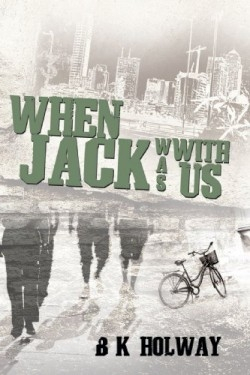When Jack Was With Us
History generally takes note of larger-than-life figures and events—it is the job of historical fiction to give readers a feel for what it was like to actually live during a particular era. B.K. Holway’s book turns a finely-ground lens upon the poor and working-class residents of the ethnic neighborhoods of New York’s Bronx during a particularly significant time in our country’s history—the late 1950s through the late 1960s. Prominent people, including President John F. Kennedy, the “Jack” of the book’s title, and contemporary world events form the backdrop against which the story takes place.
The culturally diverse urban landscape, capable of swallowing up hope in its gritty drabness, often comes out the victor as Holway’s characters—mainly Irish, Italian, Jewish, and German immigrants and their children—struggle to rise above what life has brought them. Many of them settle into poverty, despair, and drunkenness, but a few resilient individuals, notably Kevin, whom readers first meet as a boy, manage to take all that life throws at them and master it. The heart and hearth of the neighborhood is the bar owned by Kevin’s parents, and it is both a haven and a path to further dissolution for its regular patrons. Holway’s meticulous description of each character and the circumstances of their lives may seem obsessive at first, but it is necessary to show how inherited or acquired social status and patterns of behavior contribute to choices that often appear to be moved by the heavy hand of fate rather than by good sense and free will.
Much attention is given to the sexual coming of age of the neighborhood young people, many of whom learn their skills from unsavory sources, including the city’s brothels. Whether heterosexual, homosexual, illicit, or within the bonds of marriage, sexual activities are used to unmask the shadow side of Holway’s characters.
The role of the Catholic Church in the repression and domination of the poor, and politics and the running of the neighborhood political machine, are meta-themes that are explored, not with the vocabularies of religion, politics, sociology, or psychology, but in the unrefined language and behaviors of the urban poor.
B.K. Holway was born in 1951 and grew up among the working class in various New York City neighborhoods. Like his characters, he attended New York public schools. A graduate of Queens College, he earned a doctorate in Social Anthropology from McGill University, served as a Federal bureaucrat, traveled widely, and retired in 2005.
The author brings his first-hand knowledge of the ’50s and ’60s, its people, culture, and ethos to his tale and manages to hold both narrative and reader in his grip. If there is a “main character” here, it is the epoch itself—a time of rampant cultural change the effect of which is only coming to be fully recognized as the new millennium unfolds.
Disclosure: This article is not an endorsement, but a review. The publisher of this book provided free copies of the book and paid a small fee to have their book reviewed by a professional reviewer. Foreword Reviews and Clarion Reviews make no guarantee that the publisher will receive a positive review. Foreword Magazine, Inc. is disclosing this in accordance with the Federal Trade Commission’s 16 CFR, Part 255.


